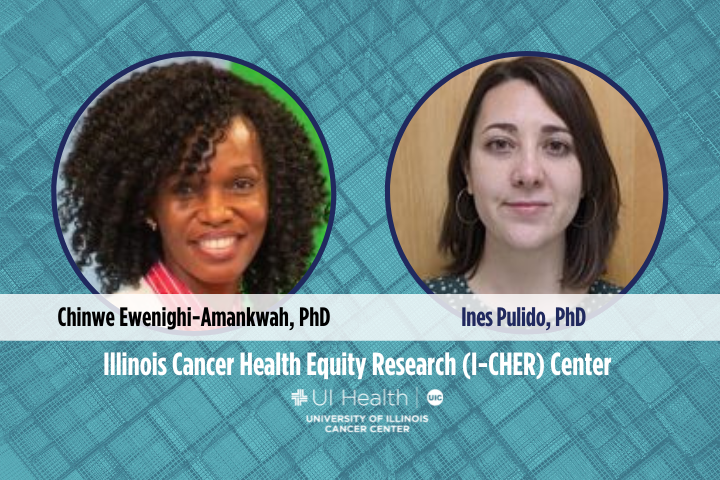
The Illinois Cancer Health Equity Research (I-CHER) Center at the University of Illinois Cancer Center proudly announces its third round of pilot grant awardees and their research projects.
The 2024 recipients are postdoctoral fellows Chinwe Ewenighi-Amankwah, PhD, in the lab of Cancer Center Director Jan Kitajewski, PhD, for the project “Duffy Status Effects on Racially Disparate Treatment in Breast Cancer,” and Ines Pulido, PhD, in the lab of Cancer Center member Takeshi Shimamura, PhD, for the project “Multi-omic Signature of Drug Resistance to Specific KRAS G12D Inhibitors.” Each will receive $30,000.
I-CHER pilot grants support research projects representing equitable solutions to tackle the social and structural determinants of cancer health through laboratory-based, translational and population-based studies.
In the excerpts below, Ewenighi-Amankwah and Pulido describe their research projects.
Ewenighi-Amankwah Research Project
Although African American women have slightly lower breast cancer rates than White women, more Black women die from breast cancer at a mortality rate of 40% higher. Duffy antigens are glycoproteins on erythrocytes that regulate immune cells. The loss of Duffy antigen results in the red blood cell Duffy-null phenotype [Fy(a−b−)]. Many Black people are carriers of this polymorphism. Duffy-null status is closely correlated with lower absolute neutrophil counts (ANC). ANCs are lower in Black individuals at a population level. With 70% of medical decisions based on laboratory values, African American patients often have ANC ranges that do not reflect reference values established from non-Black populations, leading to exclusion from clinical trials, lower dose treatment regimens, and removal of CDK4/6 inhibitors as a therapeutic option. This exclusion or sub-optimal dosing of Duffy-null patients is likely not medically appropriate, as people with the Duffy-null phenotype exhibit normal and robust responses to infection. There is a call that this clinically insignificant reduction in ANC, previously referred to as benign ethnic neutropenia, and currently, as Duffy-null associated neutrophil count/Duffy-null associated neutropenia, should not be used as a basis for the exclusion of Black people in clinical trials but to establish an ANC reference interval for Duffy null patients. It is critically important to interrogate whether current ANC reference intervals reflect the diverse population we serve and whether Duffy’s null status should be incorporated in guidance for clinical decisions based on ANC. This study looks at the treatment of Duffy null patients to determine the magnitude of treatment alterations linked to reduced ANC and establish a mouse model of Duffy null serotype to test CDK4/6 inhibitor effects on neutrophil levels.
Pulido Research Project
Advances in drug discovery have revolutionized cancer treatment in the last decades from non-specific chemotherapy to therapies that target specific tumor mutations. Recently, the development of new G12C and G12D specific inhibitors has become the first approach of targeted therapies for cancer patients with KRAS mutations, the most frequently mutated oncogene. Although these drug developments are an incredible step forward to treat patients with mutations in KRAS drug resistance to these drugs are expected and will require new therapeutic approaches to solve this problem. KRAS G12D is the most common KRAS mutation, and it is found in 37% of pancreatic tumors, as well as in 12.5% of colorectal cancer and 4.9% of lung adenocarcinoma patients. Risk factors often seen in disadvantaged communities like smoking, obesity or alcohol abuse are known causes of pancreatic and lung carcinomas. Specific inhibitors against KRAS G12D mutation, as MRTX1133, have shown impressive results in vitro and in clinical trials but cases of innate and acquired resistance are expected and then, it is critical to understand the mechanisms that support drug resistance to MRTX1133 and how tumors escape drug inhibition. This study will address the mechanisms underlying resistance to targeted therapies and will help develop predictive biomarkers to stratify patients to design novel treatment strategies. This project will provide data to design strategies to identify high-risk populations and implement preventative care, screening and surveillance of patients with KRAS G12D tumors. Our group will analyze non-genetic mechanisms of resistance to KRAS-specific therapies to find biomarkers that can identify which groups will respond and which ones will likely benefit from alternative drug treatment to provide the best therapeutic treatment to diverse groups of patients.
Past Pilot Grant Awardees
The inaugural 2022 pilot grant awardees were Cancer Center member Hunter Holt, MD, part of the Cancer Center’s Cancer Prevention and Control research program and a UI Health family medicine physician, for the project “Assessment of Guideline Concordant Cervical Cancer Screening in Chicago Using Electronic Health Record Data from a Large Research Network (CAPriCORN),” and Shaveta Khosla, PhD, MPH, a Senior Research Specialist in the Department of Emergency Medicine at the University of Illinois College of Medicine Chicago, for the project “Prevention and Screening of Cancer in the Emergency Department Patient Population (PaCE).”
The 2023 recipients were Cancer Center member Saria Lofton, PhD, RN, an Assistant Professor in the University of Illinois Chicago (UIC) College of Nursing, for the project “Developing Food is Medicine for Breast Cancer Survivors: A Lifestyle Modification for Black Breast Cancer Survivors with Cardiovascular Risk,” and Maria Jose Godoy Calderon, PhD, a Research Assistant Professor in the Department of Medicine at the University of Illinois College of Medicine Chicago in the lab of Cancer Center Deputy Director VK Gadi, MD, PhD, for the project “Surface-engineered NK/Trastuzumab Cells as a Targeted Immunotherapy for HER2-low Breast Cancer.”
The University of Illinois Chicago campus was 1 of 4 four Minority Serving Institutions that shared in more than $16 million in grants awarded by the American Cancer Society, beginning in January 2022, to establish Cancer Health Equity Research (CHER) Centers. The others were the University of Arizona, Morehouse School of Medicine in Atlanta, and Howard University in Washington, D.C. Each institution received a four-year grant of $4.08 million.
